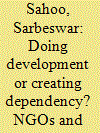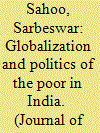| Srl | Item |
| 1 |
ID:
121115


|
|
|
|
|
| Publication |
2013.
|
| Summary/Abstract |
This paper examines the role of non-government organisations (NGOs) and the implications for democratisation in India. By analysing one such organisation, this paper argues that NGOs do not always contribute positively to the democratisation process. It shows how Seva Mandir, an NGO working in the tribal areas of Rajasthan, has adopted a purely technocratic and apolitical service delivery approach and promoted a neo-liberal model of development. The unintended consequence of promoting this model has been the growth of a culture of 'organised dependency' at the grass-roots level, which has adversely affected the larger objectives of empowerment and democratisation.
|
|
|
|
|
|
|
|
|
|
|
|
|
|
|
|
| 2 |
ID:
085155


|
|
|
|
|
| Publication |
2008.
|
| Summary/Abstract |
This paper analyses the role of Rajasthan Vanvasi Kalyan Parishad (RVKP), an ethnic Hindu(tva) organisation, among the tribal populations in south Rajasthan. It argues that the RVKP has been able to enhance its legitimacy and expand its socio-political support base among the tribals through a well-articulated and planned process of 'ethnification'. This process has been carried out in four basic ways: (1) utilising development projects as means to spread the ideology of Hindutva, (2) bringing religious awakening and organising mass re-conversion programmes, (3) redefining indigenous identity and characterising certain communities as 'the other', and (4) with the support of the various state institutions. The paper concludes that by ethnicising indigenous identity, the RVKP has not just created a 'culture of fear and violence' in the tribal regions but also threatened the secular democratic ethos of Indian society
|
|
|
|
|
|
|
|
|
|
|
|
|
|
|
|
| 3 |
ID:
129451


|
|
|
|
|
| Publication |
2014.
|
| Summary/Abstract |
The paper addresses two basic questions in the globalization literature: (1) is globalization a threat or an opportunity? And (2) how far does market deepening actually encourage genuine substantive democracy in the world? Many scholars have argued that globalization has resulted in increasing inequality and marginalization of the poor, which is not conducive for democracy. Drawing on the case of India, this paper, however, argues that the rolling back of the welfare state and the demise of developmentalism led to the mobilization of the masses against the elitist and exploitative agenda of globalization. As a result, a counter-hegemonic vibrant civil society has emerged, which challenges the hegemony of the elites and channels the empowerment agenda of the subaltern groups. This new politics of the subaltern is grounded on the idea of social justice and citizenship rights, which is redefining the nature of the Indian state and democracy.
|
|
|
|
|
|
|
|
|
|
|
|
|
|
|
|